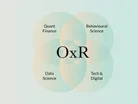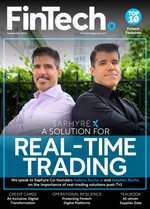Oxford Risk: Levelling up Investment with Behavioural Tech

Today, Behavioural Engagement Technology is emerging as a potent tool for banks and wealth management firms to connect with their clients on a deeper, more personalised level.
Greg Davies, Head of Behavioural Innovation at Oxford Risk, sheds light on this burgeoning field and its potential to revolutionise the way financial institutions interact with their customers.
Oxford Risk, originally a spin-out from Oxford University in 2002, has transformed from a consulting vehicle for academics into a pioneer in Behavioural Engagement Technology.
Greg, who joined the company in 2017, brings a wealth of experience from his time at Barclays, where he spent a decade building a behavioural finance team within the bank's wealth management division.
“I spent ten years building the industry experience of what to do with risk tolerance, how to put it into a broader suitability context, how risk tolerance intersects with risk capacity, and what other dimensions of financial personality we might want to know,” Greg explains, highlighting the practical applications of behavioural science in finance.
The core of Oxford Risk's offering is a sophisticated psychometric tool that measures not only risk tolerance but also multiple dimensions of financial personality. This tool forms the foundation of the company’s broader suite of suitability tools, which includes client profiling, fact-finding algorithms and quantitative risk measures.
The perks of Behavioural Engagement Technology
However, the real innovation lies in the company's Behavioural Engagement Technology. This cutting-edge approach combines psychological profiling with targeted messaging to help financial institutions better engage with their clients.
Greg elaborates: “We've got all these stories, buttons and levers we can push from the academic behavioural literature and from having worked with people for 20 years. And on the other side, we've got data-driven measurements of who people are.”
The technology works by creating a "map" of an individual's financial personality and using this information to determine the most effective way to communicate with them. This could involve tailoring narratives, nudges or specific messaging strategies based on the individual's unique profile.
“The complexity of the model is to take a map of a person and use the technology to tell you what stories and narratives to convey to people,” Greg says.
He adds that machine learning algorithms play a crucial role in refining these strategies over time, allowing the system to learn and adapt based on real-world interactions.
The potential applications of this technology are vast. From helping investors overcome behavioural barriers to good investing, to identifying behavioural vulnerability in clients to meet regulatory requirements, the system can be tailored to address a wide range of use cases.
One particularly promising area is in the realm of sustainable investing. Greg notes: “We can use it in the sustainability and ESG world to identify those people who have non-financial values that they want to satisfy through their portfolio.”
The technology also has applications in client acquisition. “We can use it in prospecting,” Greg explains. “Once you know something about someone's financial personality, you can tailor your approach to persuade them to join your firm rather than another.”
The issue of data access
Despite the clear potential, Greg acknowledges that the technology faces a chicken-and-egg problem. While Oxford Risk has developed the intellectual property, algorithms and profiling tools, they need access to more real-world client data to refine and prove the effectiveness of their system.
“We already have proof of concept projects up and running with a small number of innovative clients globally, and the combination of our Financial Personality profiles with real-time observations of client interactions opens up a huge potential for hyper-personalised client engagement to nudge better decisions”, Greg says.
The promise of Behavioural Engagement Technology is compelling. By enabling financial institutions to engage with their customers as individuals, rather than broad demographic categories, it offers the potential for a win-win scenario.
Customers benefit from overcoming behavioural barriers to good investing, while banks can grow their assets under management, improve client retention and foster loyalty.
As the financial industry continues to grapple with personalisation and client engagement challenges, Behavioural Engagement Technology stands poised to play a pivotal role.
Greg concludes: “We as an industry are already starting to take our first steps towards this. We've been building the IP, the technology and the profiling tools, but for the machine to learn, it needs even more data. We’re really looking forward to working with our clients to help their investors make even better financial decisions in the future.”
**************
Make sure you check out the latest edition of FinTech Magazine and also sign up to our global conference series – FinTech LIVE 2024.
**************
FinTech Magazine is a BizClik brand.


